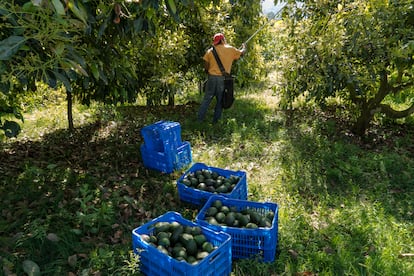US ban on Mexican avocados puts 300,000 jobs and $3-billion industry at risk
The decision to halt imports of the fruit is a huge blow to Mexico, which exports more than half of its production, with 81% of this figure going to the United States

The decision by the United States to halt imports of avocados from neighboring Mexico is a blow to the latter country right where it hurts: the oily fruit is the third most important Mexican export product. Mexico produces more than a third of the world’s avocados, making it the biggest producer on a global scale. Of the total exports, 81% go to the US, which is Mexico’s main trade partner and the biggest market on the planet. Exports to the US generated more than $2.8 billion (€2.47 billion) last year, which translates into 300,000 direct and indirect jobs, according to data from the GCMA agricultural consultancy firm.
The US government suspended avocado imports from Mexico on February 11 on reports that one of its inspectors had received a threatening phone call in the state of Michoacán, the main producer, and an area that has suffered greatly from violence from organized crime.
“This is a serious problem because it’s a perishable product,” explains Juan Carlos Anaya, the GCMA director. On average, he explains, between 100,000 and 130,000 tons of avocados are produced on a daily basis. These will now have to be sold at a lower price in the domestic market or to a third country.
“Looking for other alternatives will not be easy, and so I believe that the Mexican government must find an agreement with the authorities from the Department of Agriculture and the Embassy so that once the investigation is complete, and the measures that need to be taken are defined, avocado exports can be quickly activated.”
In 2021, Mexico produced nearly 2.5 million tons of avocados, of which 1.4 million were exported. That’s to say, more than 52% of what is produced in Mexico is exported. “The value of the exports is breathtaking,” Anaya explains. “It’s our third-biggest product after beer and tequila.” In 2021, they accounted for $3.4 billion (€2.99 billion) of exports.
It’s our third-biggest product after beer and tequilaJuan Carlos Anaya, director of GCMA agricultural consultancy firm
Historically, the avocado has been used as a means of pressure in relations between the US and Mexico. More than 100 years ago, according to a report from the University of Navarre (UNAV), US health authorities banned imports of Mexican avocados on the basis that the seed contained a kind of weevil that threatened crops and land. At the end of the 1970s, the Mexican government called on the US to lift the ban, but the authorities rejected the request.
It wasn’t until the free-trade agreement between the US, Mexico and Canada came into force – known then as NAFTA – that exports resumed. This had a gradual impact on Americans’ diets, to the point where the fruit is now a basic product.
TLCAN was renegotiated in 2018 and became the USMCA, and has been in place since 2020. In 2019, then-US president Donald Trump threatened to close the border with Mexico to stop the flow of migrants, a move that single-handedly saw the price of avocados rise by more than 30%.
On Monday, Mexican President Andrés Manuel López Obrador stated that he suspected there was an economic interest behind the ban. “We need to see what it is about,” he said at a press conference. “There are also a lot of economic and political interests here, there is competition, they didn’t want the Mexican avocado to enter the US or predominate due to its quality.”
“Some, like the president, are speculating that it is a non-tariff barrier to put pressure on issues that we are bringing in relation to the US,” Anaya explains. “Some are speaking of this as a way for the US government to put on pressure about the energy law.” At the end of last year, López Obrador sent a draft law to Congress that would cancel energy contracts with private companies, many of them American, in order to award them to state companies. In recent weeks, while the proposal was awaiting debate and a vote in Congress, two members of US President Joe Biden’s Cabinet have visited Mexico to address the “serious concerns” over the plans.
Data from the GCMA show that agricultural exports, including beef, livestock, blackberries, blueberries, tomatoes and sugar, among others, generated profits of $44 billion (€38.65 billion) last year, with 81% of products going to the US.
Tu suscripción se está usando en otro dispositivo
¿Quieres añadir otro usuario a tu suscripción?
Si continúas leyendo en este dispositivo, no se podrá leer en el otro.
FlechaTu suscripción se está usando en otro dispositivo y solo puedes acceder a EL PAÍS desde un dispositivo a la vez.
Si quieres compartir tu cuenta, cambia tu suscripción a la modalidad Premium, así podrás añadir otro usuario. Cada uno accederá con su propia cuenta de email, lo que os permitirá personalizar vuestra experiencia en EL PAÍS.
¿Tienes una suscripción de empresa? Accede aquí para contratar más cuentas.
En el caso de no saber quién está usando tu cuenta, te recomendamos cambiar tu contraseña aquí.
Si decides continuar compartiendo tu cuenta, este mensaje se mostrará en tu dispositivo y en el de la otra persona que está usando tu cuenta de forma indefinida, afectando a tu experiencia de lectura. Puedes consultar aquí los términos y condiciones de la suscripción digital.









































